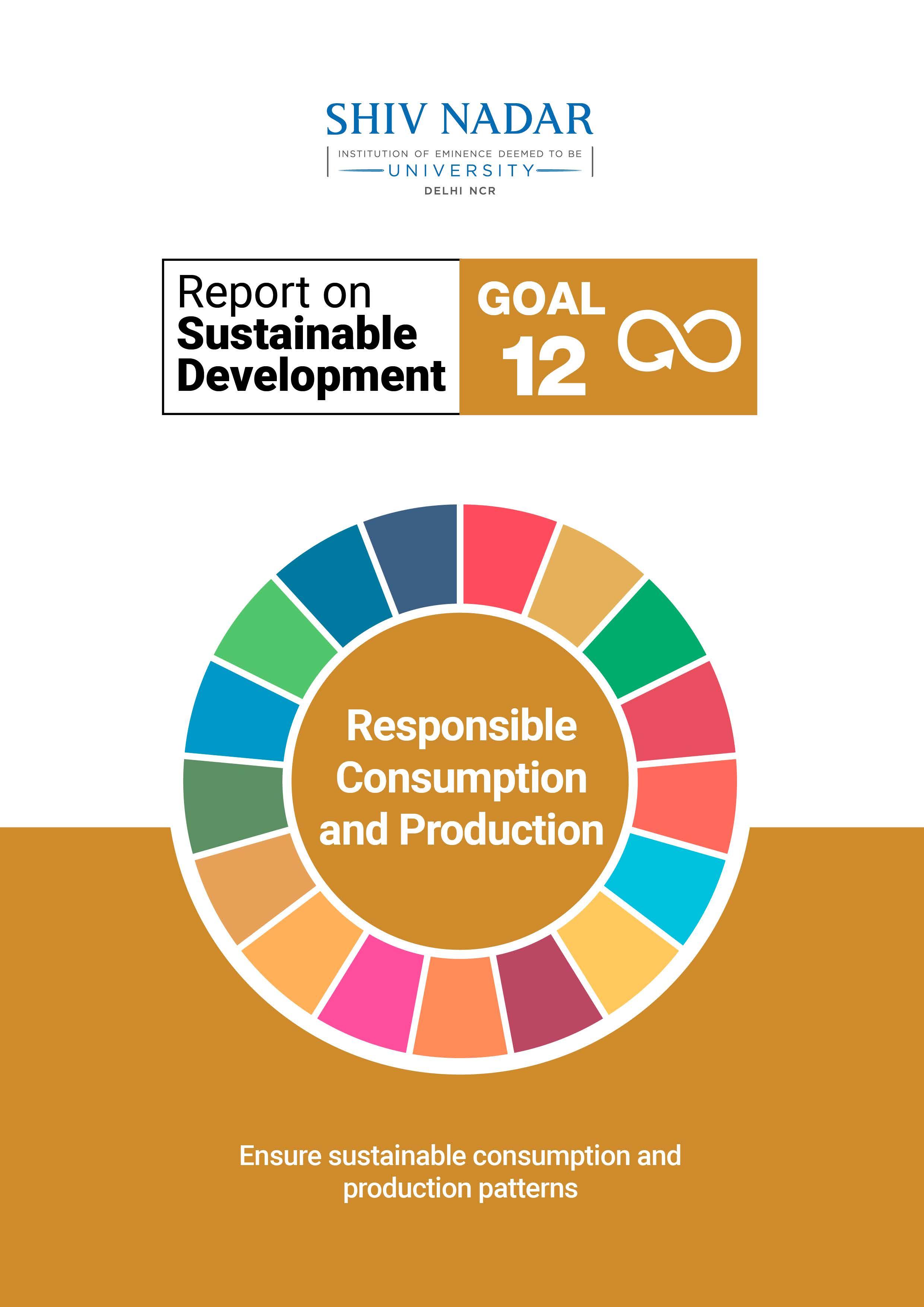



The greed of gain has no time or limit to its capaciousness. Its one object is to produce and consume. It has pity neither for beautiful nature nor for living human beings.”
— Rabindranath Tagore
This quote highlights the dangers of unchecked consumerism and aligns with the call of SDG 12 to consume and produce in sustainable, mindful ways.
Sustainable Development Goal 12 addresses the urgent need to ensure mindful use of resources, energy efficiency, and sustainable consumption, infrastructure, essential services, and green jobs, as well as to ensure a better quality of life for all. With 11 targets and 13 indicators, the goal aims to achieve the defined patterns of activities by 2030 –highlighting the dangers of unchecked consumerism. In short, the success of SDG 12 holds the key to sustaining not only the current but also the future generations.
Shiv Nadar University is a sprawling green campus spread across 300 acres in a rural-urban landscape. By the very nature of its location, multidisciplinary nature, and strong foundational spirit, it thrives on the belief that the highest education does not merely give us information but makes our life in harmony with all existence.
A mini city in itself, the campus is surrounded by agricultural land, with the wetlands of Bil Akbarur on one side and a national highway on the other. The surrounding landscape has witnessed rapid transformation due to urbanization.
On campus, we have made every effort to proactively plan, act, and propose ways for responsible consumption and production through teaching, research, and institutional practices, and at the same time, partner with institutions to grow and advance on the idea of responsible consumption and production.
TEACHING AND LEARNING
At Shiv Nadar, we are committed to offering meaningful education around sustainability and related areas to all students across the University besides our core subjects. For undergraduate students, many compulsory courses are regularly offered, such as Environmental Studies (CCC 704), Biodiversity: Assessment & Conservation (CCC 706), Environmental Impact Assessment (CCC 406), Use of Energy in our Daily Life (CCC 624), and Green Energy Technologies (CCC 613), to name a few.
The School of Management and Entrepreneurship offers many core courses with sustainability elements integrated across the curriculum of undergraduate and graduate programs. Sustainable Business Strategy (STM205) is a three-credit course. As a part of its project, the students are encouraged to look at the Campus as a Living Lab and work
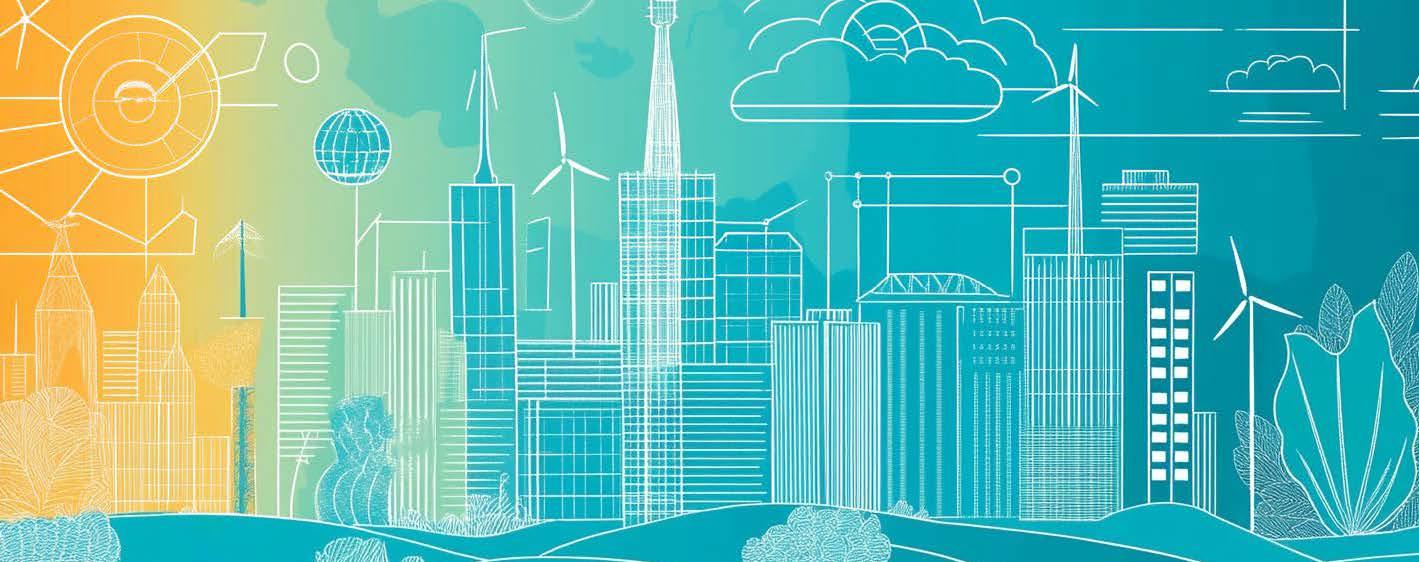
on sustainability initiatives for the Shiv Nadar campus. These projects address several key topics in sustainability, such as air quality, solar power, sustainable transport, no plastic, waste management for a circular economy, and many more, enabling them to think of sustainability as a living reality.
Student Stories
UN Millennium Fellowship for Shiv Nadar University Students
Our students were selected as UN Millennium Fellows for 2024. This fellowship is presented by the United Nations Academic Impact and MCN and supports undergraduate leadership for the UN Sustainable Development Goals. From 52,000+
applicants from 6,000+ campuses worldwide, 280+ campuses (just 5%) have been selected to host 4,000+ Millennium Fellows in 2024.
The students were guided by their Professors, Dr. Paromita Goswami and Aadya Kaktikar from the School of Management and Entrepreneurship and the School of Humanities and Social Sciences. The award is a testament to the university’s commitment to address SDGs while empowering and nurturing global leaders who will direct and shape policies, advance research, and encourage local action to protect the larger global community from future risks.
contributions and educating students.
The partnership offers a variety of opportunities for experiential education. At the same time, the engagement will enable students to be conscious consumers and gain experiences and skills that will prove valuable in their pursuit of higher education and careers. Further, the partnership will enhance the University’s reputation in ranking programs and student recruitment.

Impact of Resilience, Robustness, and Realignment on Sustainable Supply Chain
Vaishnavi, a Ph.D. scholar, works with Dr. Vijayta Fulzele at the School of Management and Entrepreneurship. Her Ph. D. research area is helping advance sustainable supply chain in Operations Management. It centers around ‘Impact of Resilience, Robustness, and Realignment on Sustainable Supply Chain: A Study on Automobile Industry’.
She is investigating how these factors are shaping the sustainability of the automotive supply chains. Her paper, titled “Examining the Influence of Sustainable Operational Practices on Corporate Performance: A Study on the Automotive Sector,” has been accepted for presentation at the 33rd European Conference on Operational Research (EURO 2024), to be held in Copenhagen, Denmark, from June 30th to July 3rd, 2024.

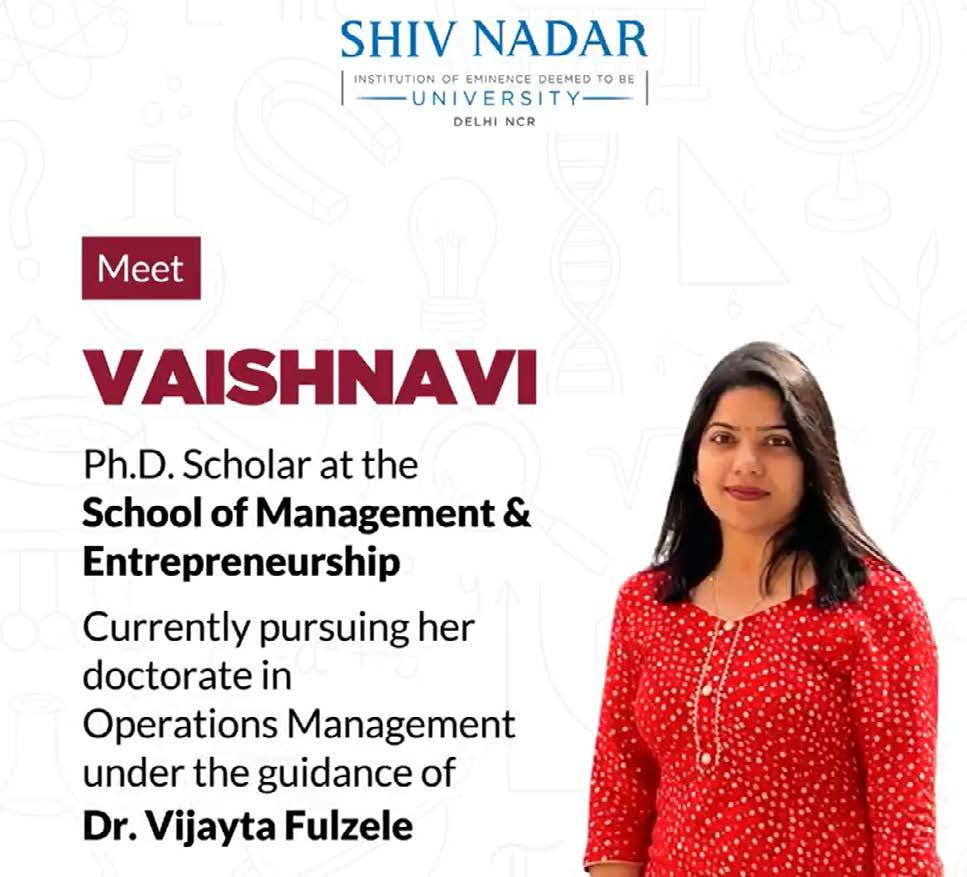
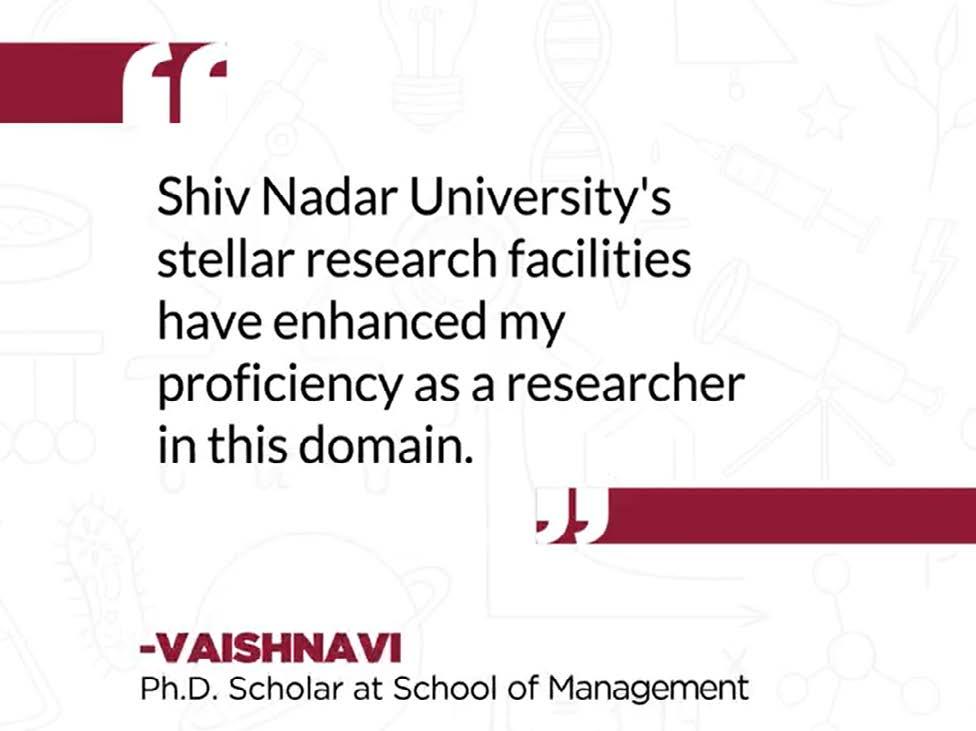
Impact of Circular Economy on Business Performance
Harsahib Singh, a Ph. D. scholar, is working with Dr. Rashmi Aggarwal, Professor, School of Management and Entrepreneurship, in the area of Impact of
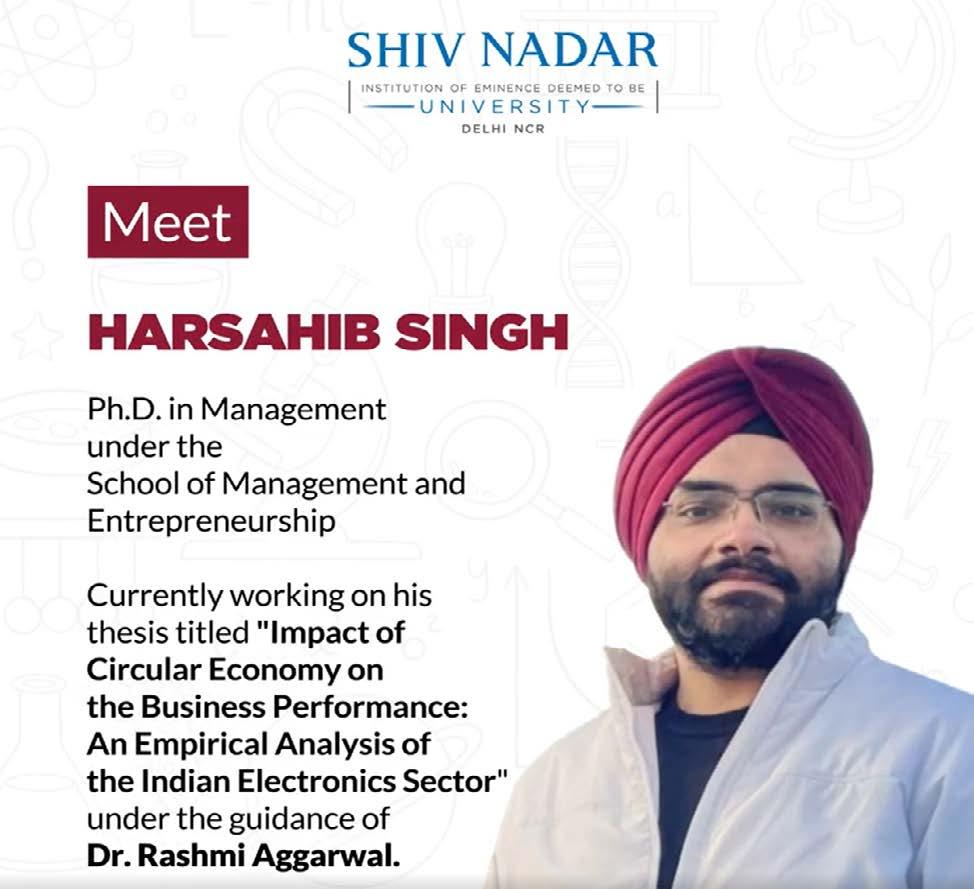
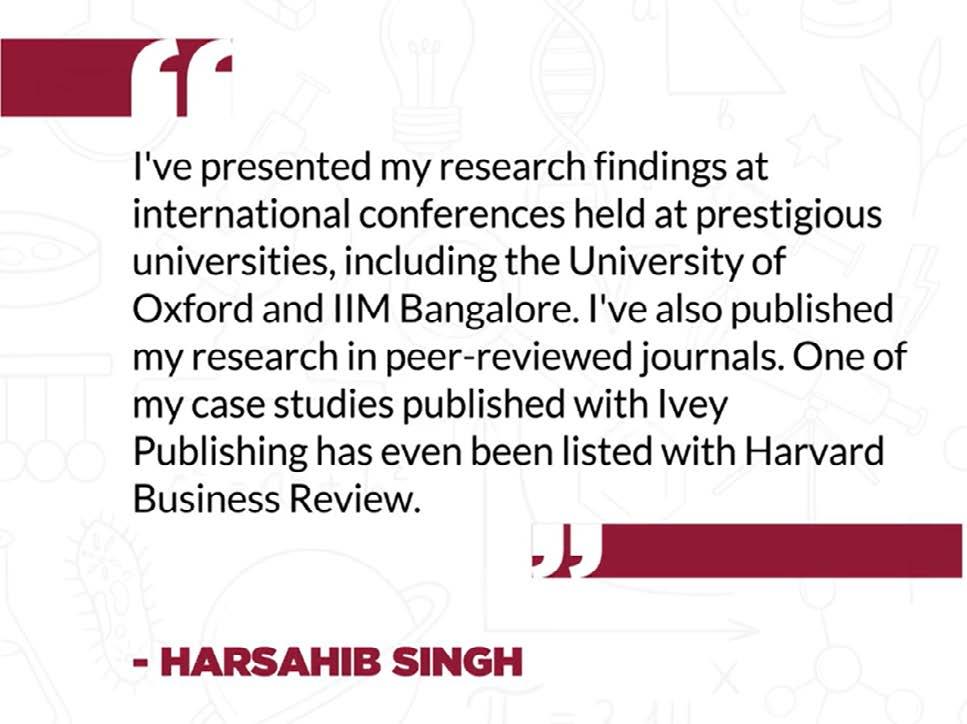
Circular Economy on the Business Performance: An Empirical Analysis of the Indian Electronics Sector. Harsahib has presented his research at prestigious conferences and institutions and published his findings in peer-reviewed international journals.
Go Green Club – Health and Sustainable Lifestyle
A sustainability event focused on personal care products was held, raising awareness about the industry’s environmental impact. The event highlighted alternatives like bamboo sanitary napkins and menstrual cups. Around 150 women on campus participated and learnt about the eco-friendly choices and the dangers of chemicals in traditional products. Fun quizzes encouraged a shift towards a more sustainable lifestyle.
The event also partnered with Active Dreams, who provided menstrual health awareness and instructional sessions using menstrual cups, a new and sustainable alternative to sanitary napkins.
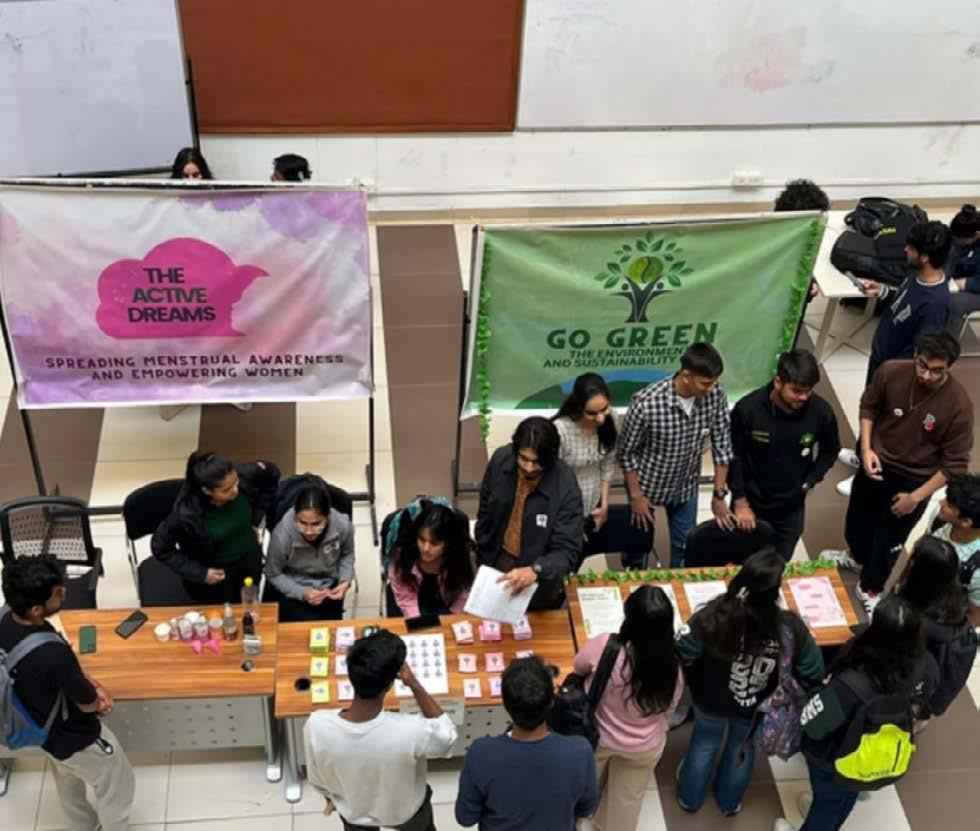
Green the Red – An initiative to improve the wellbeing of the workers and the environment.
The MBA students organized a Donation Drive (part of their marketing project) to arrange reusable cloth sanitary napkins for Group D women employees (janitors, security, gardeners) at Shiv Nadar University.
The idea was to address the use of disposable sanitary napkins, which most women use, which have adverse effects on the health of women and the environment, and indirectly affect the well-being of sanitation workers and us due to the prevailing waste disposal practices.
The students also aimed to raise a minimum of 15,000 INR+ based on surveys and statistics on the purchase of cloth sanitary napkins for these women.

Thrift Store – All about Sustainability
This student-created concept on campus encourages everyone to donate pre-loved items like clothing, footwear, stationery, books, etc. The pricing is mutually decided between the core team of the ZIRO store and the donor. This became a popular activity to give back to the community and, at the same time, get some money.

RESEARCH
Finding new ways to produce maleic anhydride
Dr. Rajesh VM, Associate Professor, Department of Chemical Engineering, offers a potential path for India to be self-reliant in producing maleic anhydride.
Maleic anhydride, a white powder, is the proverbial pivot that propels industries worldwide. The sheer versatility of this chemical pegs its global market value at a staggering $4.8 billion, projected to cross $7 billion by 2032.
Dr. Rajesh’s research, in collaboration with Bharat Petroleum’s Corporate Research and Development Centre, also stands as an example of the symbiotic relationship between industry and academia.
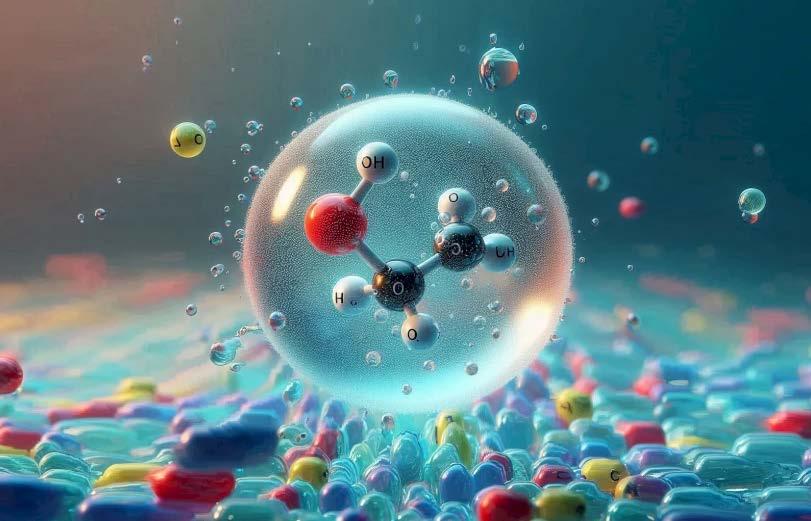

Building a Smart Future, Brick-byBrick
Dr. Sumedha Moharana, Associate Professor, School of Engineering, is engaged in multidisciplinary research that aims to evaluate the health of structures and find measures to maintain their longevity. Working at our state-of-the-art Concrete Laboratory and Dassault Systèmes Center of Excellence, she is collaborating with the Archaeological Survey of India (ASI) to study how India’s historical structures can be preserved for future generations to observe and study. Discover how innovative technologies, like sensors and AI, are being used to assess the health of buildings, ensuring a smarter and more resilient future.
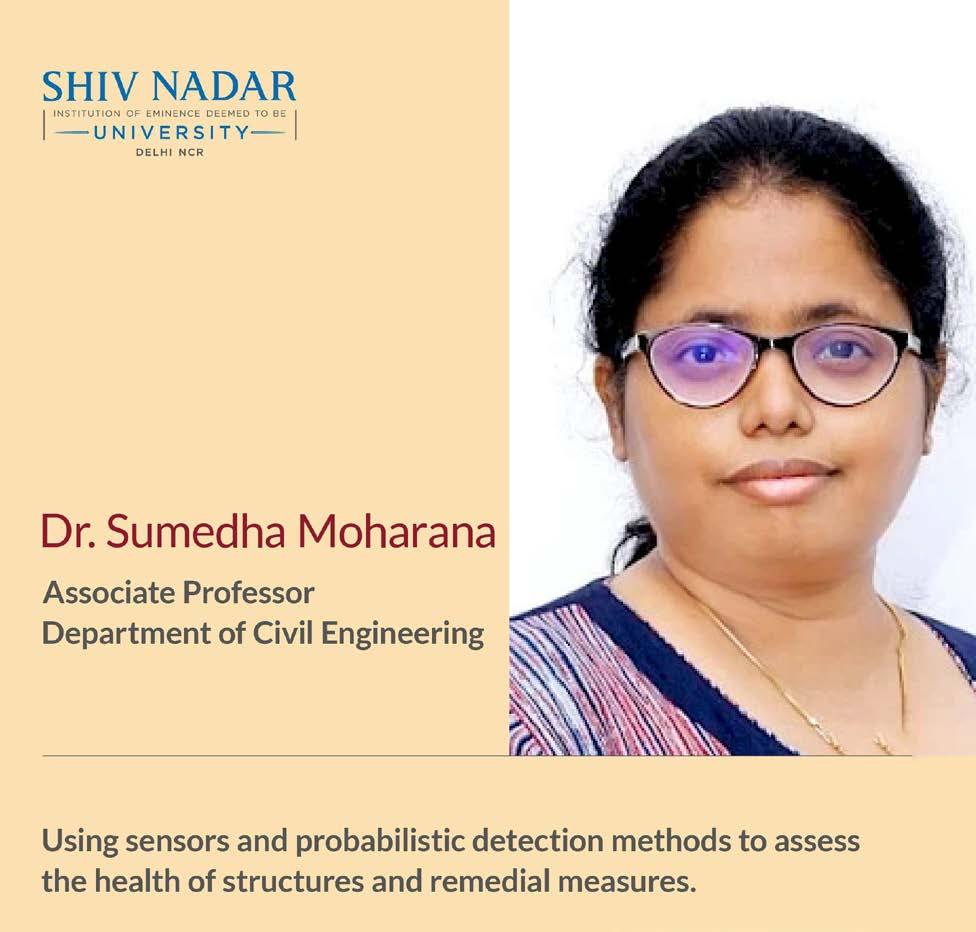
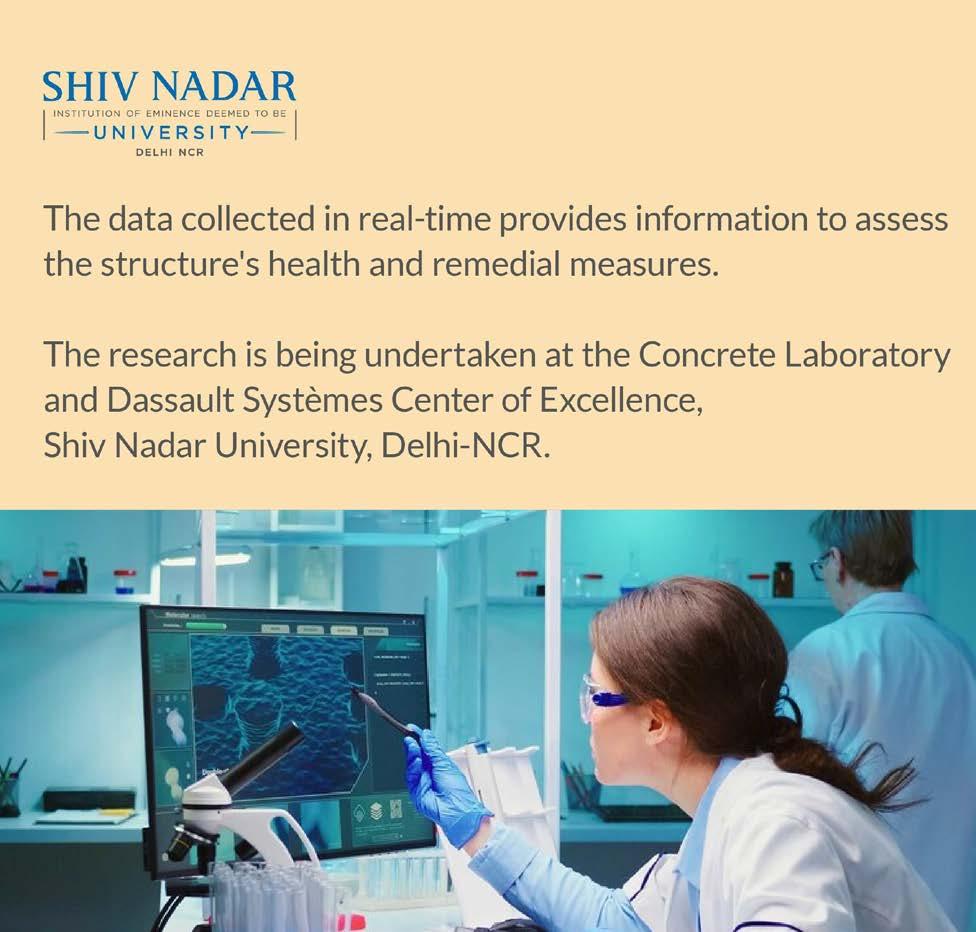
Faculty awarded the prestigious Concrete Technologist of the Year award
Dr. Ghanshyam Pal, Associate Professor, Department of Civil Engineering, has been honoured with the prestigious Concrete Technologist of the Year (Academics) 2024 by the Concrete Engineers Association, India.
This recognition highlights his outstanding contributions through research on cementitious materials, including concrete, and his commitment to developing innovative solutions for alternative sustainable construction materials.
Established in 2018, the Concrete Engineers Association (CEA) is a non-profit organization dedicated to advancing the science and technology of concrete, cement, and sustainable construction materials. Currently, with more than 2000 active civil engineers, working professionals, and concrete enthusiasts as its members, the CEA is a vibrant community of experts from industry, academia, research, and government bodies.
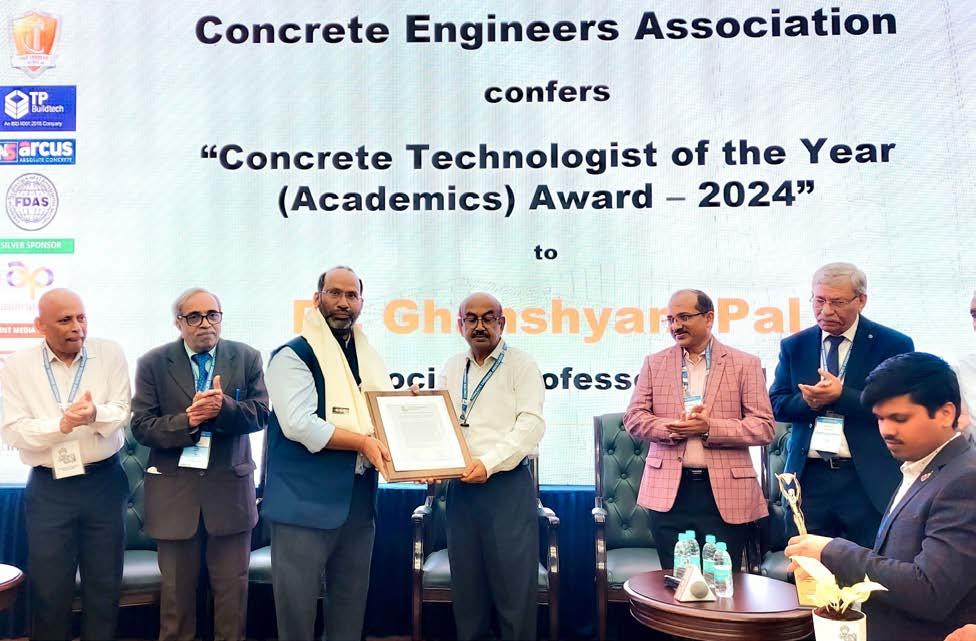
Shiv Nadar University Pioneers Eco-Friendly Polymers For Carbon Neutrality
Dr. Bimlesh Lochab, Professor, Department of Chemistry, and Dr. Sangeeta Sahu, Post Doctoral scholar at Shiv Nadar University, have developed sustainable polymers from waste sulfur and cardanol, offering a promising solution to plastic pollution and carbon emissions. This is an innovative solution to the global challenge of carbon neutrality. Their research has been published in the ACS Sustainable Chemistry & Engineering journal, introducing a new
class of waste-derived polymers, utilizing naturally abundant feedstocks and achieving attractive features.
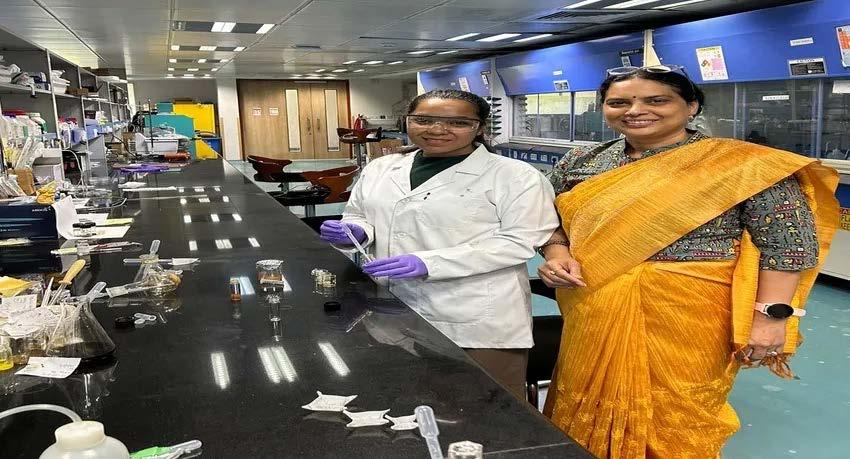
Solutions of Tomorrow – Biodegradable food wrapping
Dr. Yamini Sudha, Associate Professor, Department of Chemical Engineering, has used pectin biopolymer to develop composite thin films for bio-degradable vegetable and fruit wraps. Her research aims to significantly boost the shelf life of produce and reduce hazards to the human body and nature.
The biodegradable wraps are made by extracting pectin from bananas, oranges, and sweet lime. They are a natural, edible coating that can replace
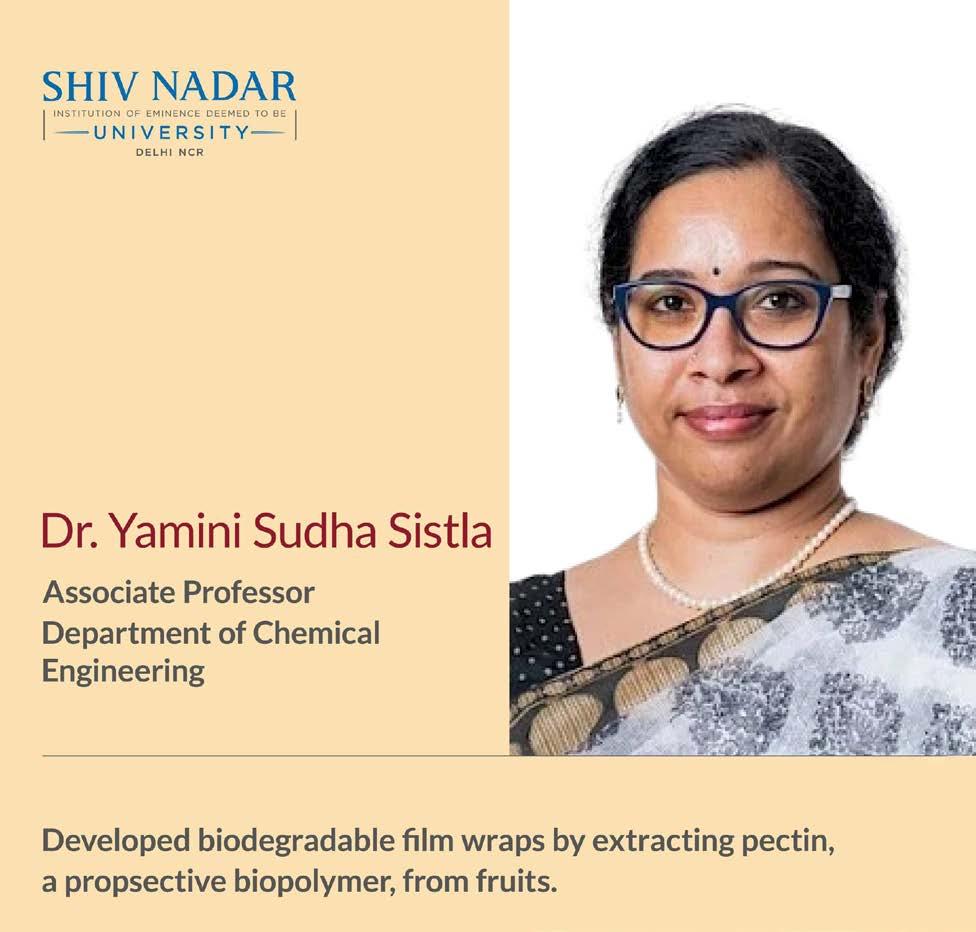
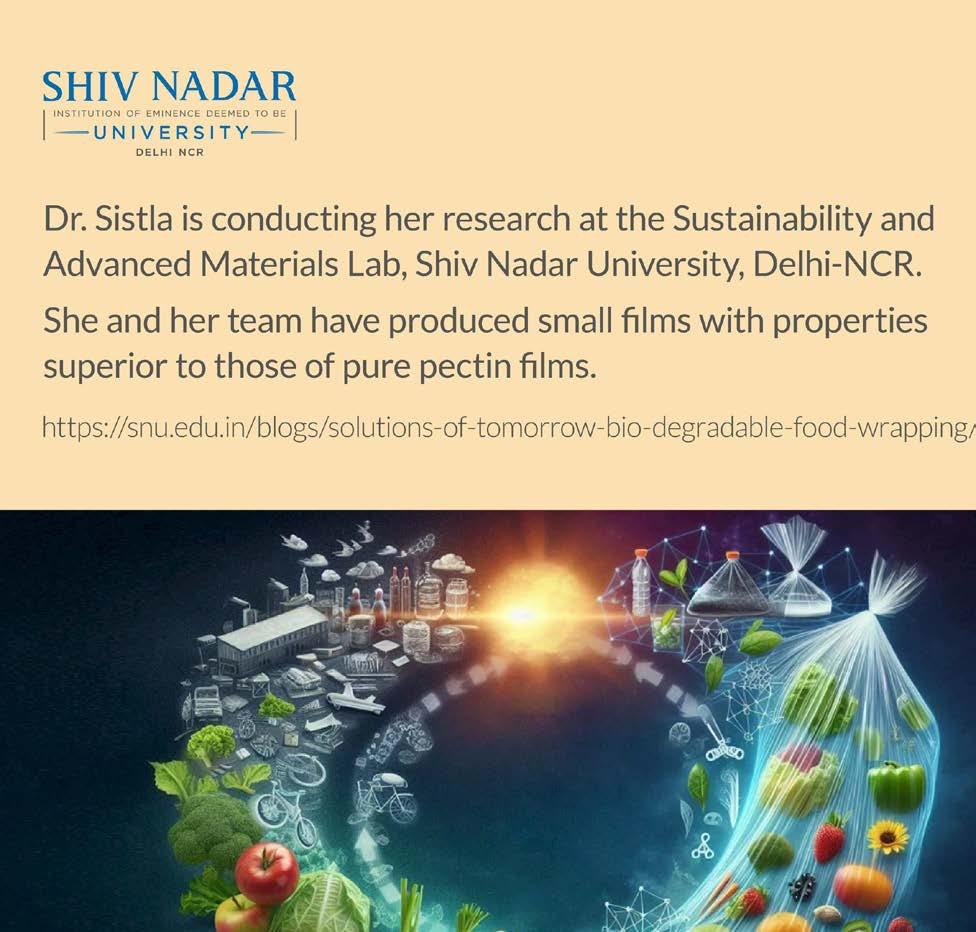
synthetic wax, which gives fruits gloss and longevity. She and her research group have successfully produced small films with improved properties compared to pure pectin films. “We are now working on process-related improvements to scale up the film production with the required physical, chemical, and mechanical properties,” she says.
Dr. Sudha’s research is linked to SDG 3 (good health and well-being), SDG 11 (sustainable cities and communities), SDG 12 (responsible consumption and production), and SDG 13, 14, and 15 (climate action, life below water, and life on land).
Applications of drones in precision agriculture: future of smart and sustainable farming
Agricultural drones/unmanned aerial vehicles are aerial devices that can be employed in precision agriculture (PA). This technology not only helps the farmers increase their farm productivity but also helps in timely and convenient crop monitoring in the fields. Drones facilitate seed sowing, soil condition monitoring, irrigation scheduling, assessing crop conditions for their health, estimating stress, and livestock management. This chapter provides insight into the applications of drones in PA and is helpful to planners and decision-makers in agricultural research. Tyagi, Ritvik, and Prem Chandra Pandey. “Applications of drones in precision agriculture: future of smart and sustainable farming.” In Remote Sensing in Precision Agriculture, pp. 429-453. Academic Press, 2024.

Bioenergy Production via Thermochemical Conversion of Waste Biomass
Dr. Sanjeev Yadav, Associate Professor, Department of Chemical Engineering, and his group are working on thermochemical conversion of waste biomass into different forms of bioenergy through an experimental and simulation study.
Improper waste biomass management leads to many environmental concerns, like greenhouse gas emissions, soil degradation, and water contamination. The research group offers an alternative to waste management by using thermochemical conversion methods to generate energy. This year’s experimental studies involved the conduct of steam gasification and fast pyrolysis of mixed food waste. Steam gasification was conducted in the presence of a novel catalyst, which significantly enhanced hydrogen production. It also helped reduce the tar generation effectively from the steam gasification of mixed food waste. The second experimental work studied the effect of hot vapor residence time (HVRT) on bio-oil production via fast pyrolysis of mixed food waste. It showed that HVRT seriously affected the occurrence and disappearance of the important phase separation phenomenon. Additionally, this study showed that the bio-oil contained a large fraction (80–95 %) of fatty acid alkyl esters (FAAEs), which is the potential blend for fossil-based diesel. The third study was a modelling and simulation work done using Aspen Plus for groundnut shell gasification using
a bubbling fluidized bed gasifier. The developed model is in agreement in terms of composition, yield, and higher heating value of the syngas generated experimentally.
CONVERSATIONS ON CAMPUS
International Conference on Sustainable Nanomaterials Integration & Organization for Energy and Environment (iSNIOE2-2024)
Shiv Nadar University, in partnership with the University of New South Wales, Sydney, Australia, and KTH Royal Institute of Technology, Sweden, organized the International Conference on Sustainable Nanomaterials Integration & Organization for Energy and Environment (iSNIOE2-2024). With over 250 participants from India and abroad, this four-day conference united researchers and practitioners from academia, industry, and research laboratories worldwide, facilitating the dissemination of knowledge in sustainable nanomaterials and their innovative applications in renewable energy and environmental conservation.
The conference showcased 183 presentations, comprising 11 Plenary Speakers, 20 keynote speakers, 47 invited speakers, 46 oral presentations, 59 poster presentations, and over 60 speakers and researchers from various parts of the world.
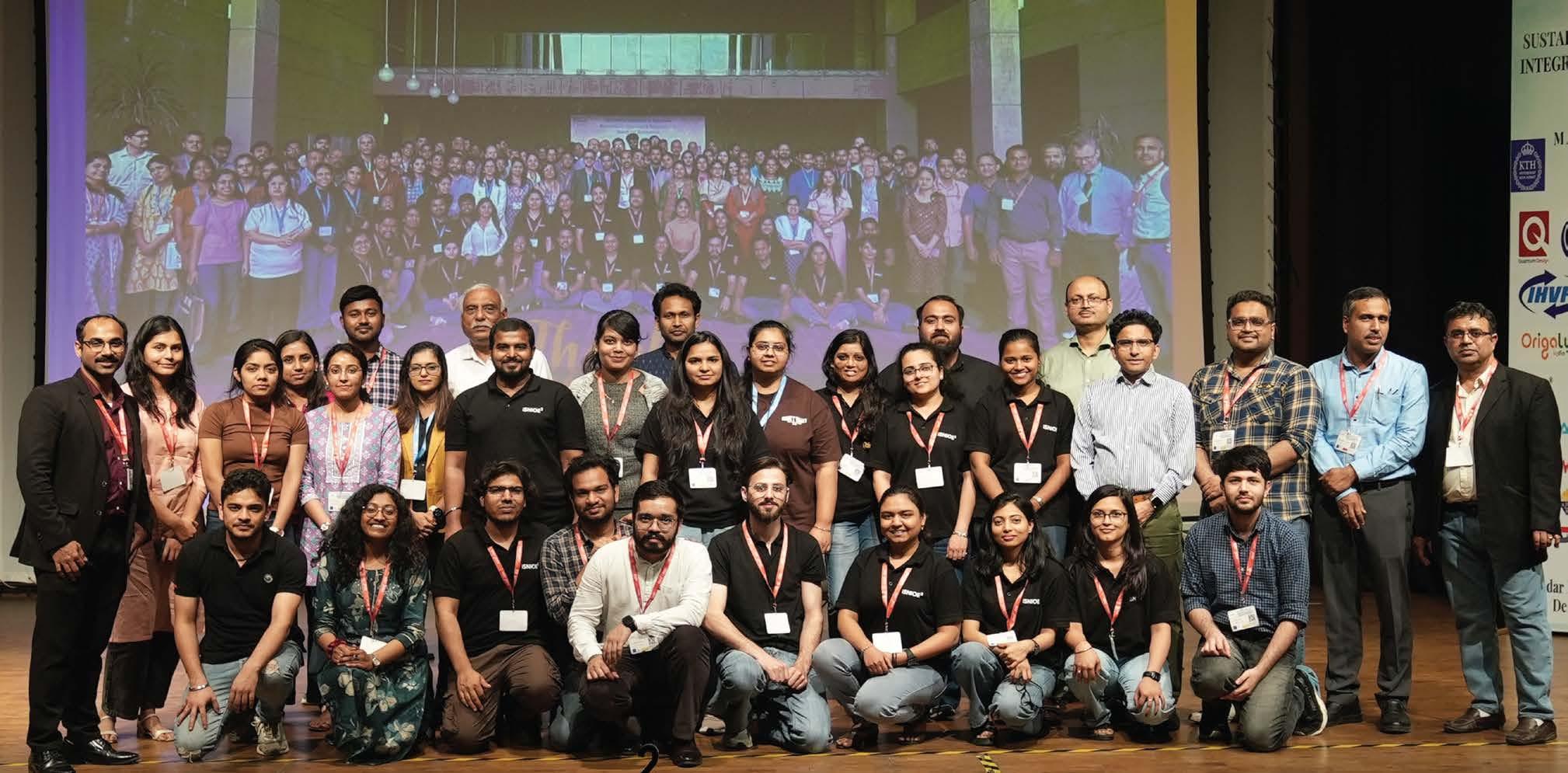
MAGSOS Conference on Modern Aspects of Green and Sustainable Organic Synthesis
The Department of Chemistry, School of Natural Sciences, Shiv Nadar University, in collaboration with HEIA-FR, Chemistry Department, Switzerland, organized MAGSOS, a conference on Modern Aspects of Green and Sustainable Organic Synthesis, at Shiv Nadar University campus on November 2629, 2024.
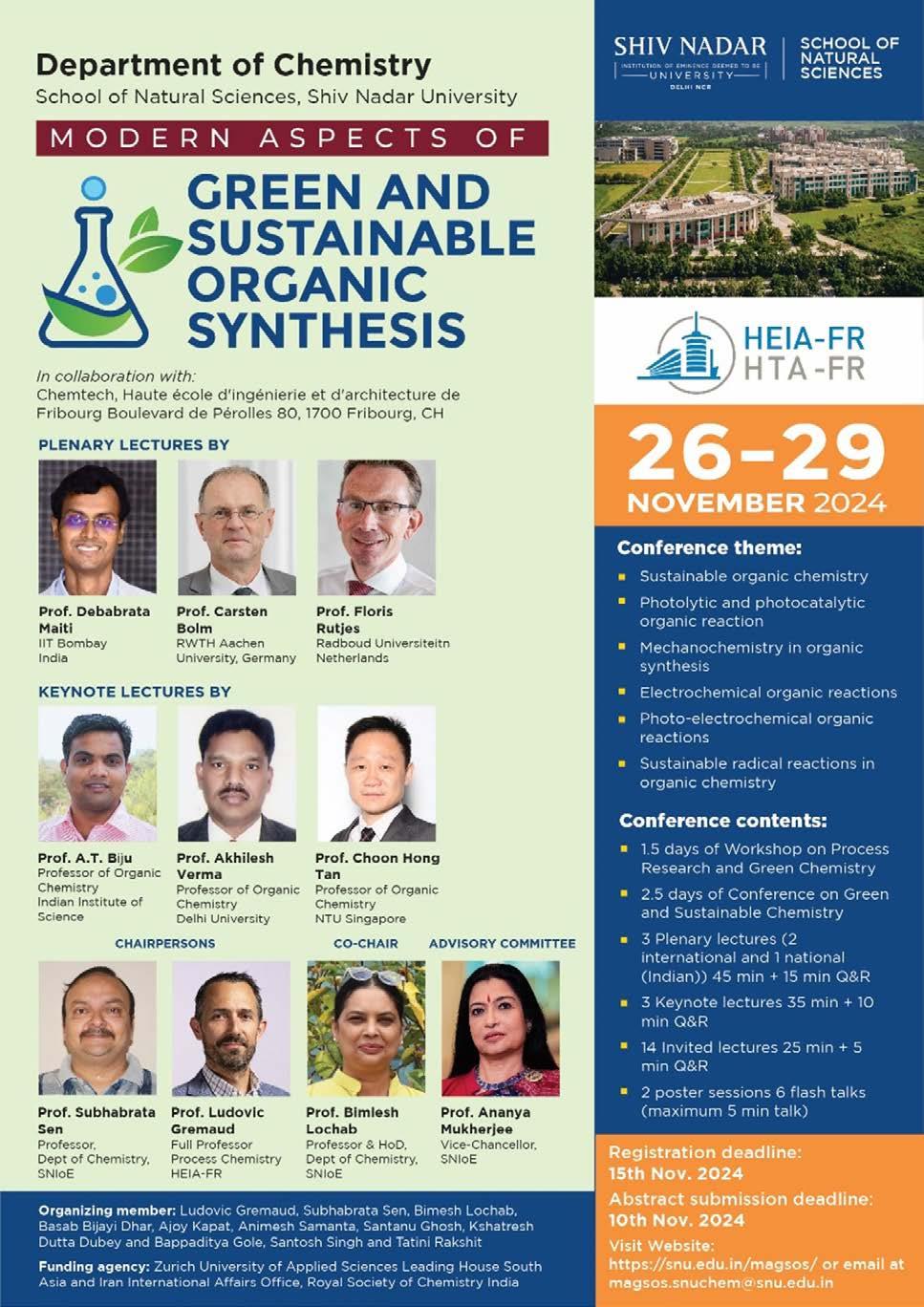
Discussion to explore research partnerships between the University and India’s biggest commercial oil corporation
Shiv Nadar University Delhi NCR on Wednesday hosted Mr. ALOK SHARMA, Director, Research and Development Centre, Indian Oil Corporation Limited (IOCL), along with his leadership team.
Discussing on ways to explore research partnerships between the university and India’s biggest commercial oil corporation in nanotechnology, renewable energy, sustainable energy technologies, energy storage and conversion, and materials
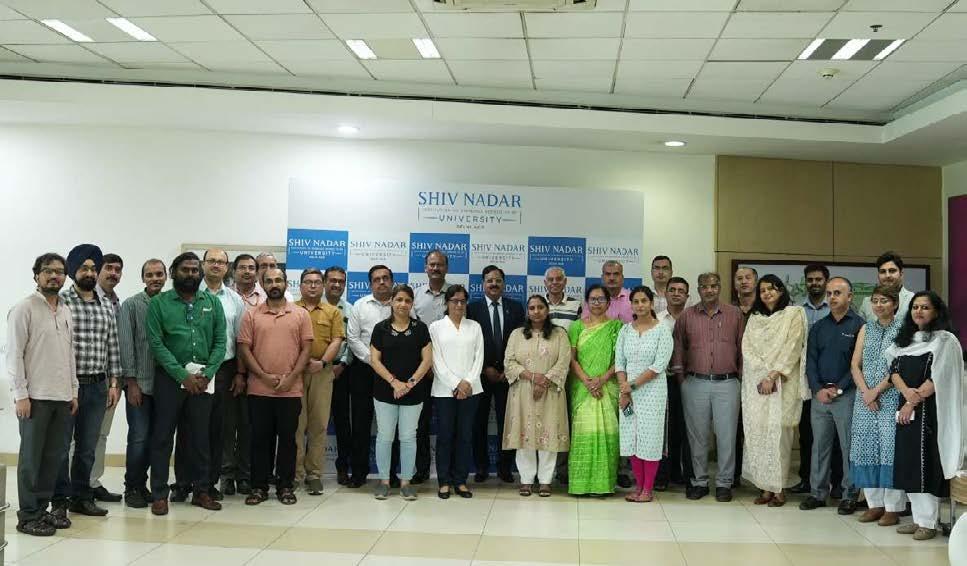
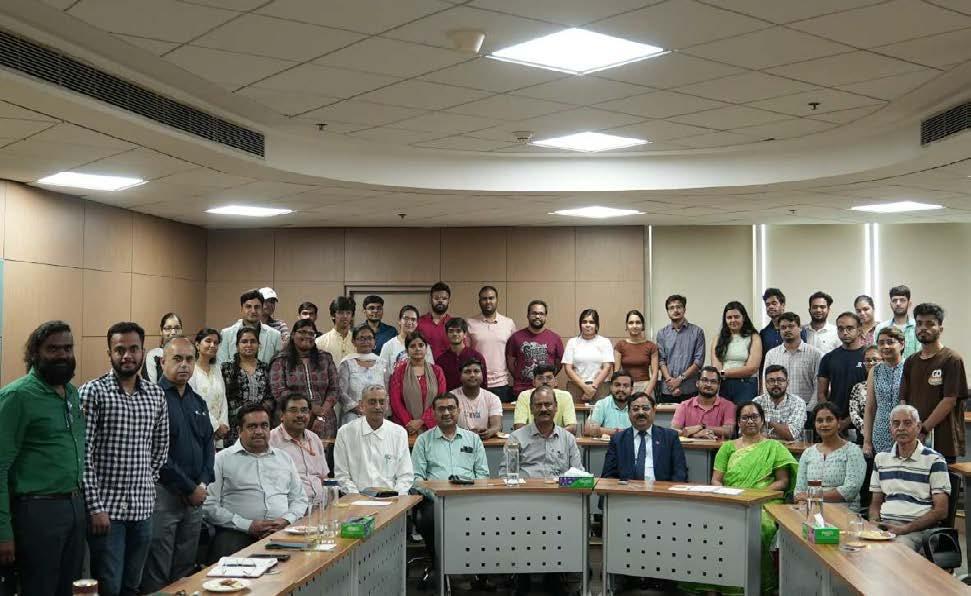
processing, Mr. Sharma highlighted, Despite being a young institution, the research done by Shiv Nadar University is commendable. There are many opportunities for collaboration in research and industry-oriented projects that can drive innovation, boost economic growth, and contribute to societal progress. Such collaborations can help convert research into marketable products and services with the support of the industry.
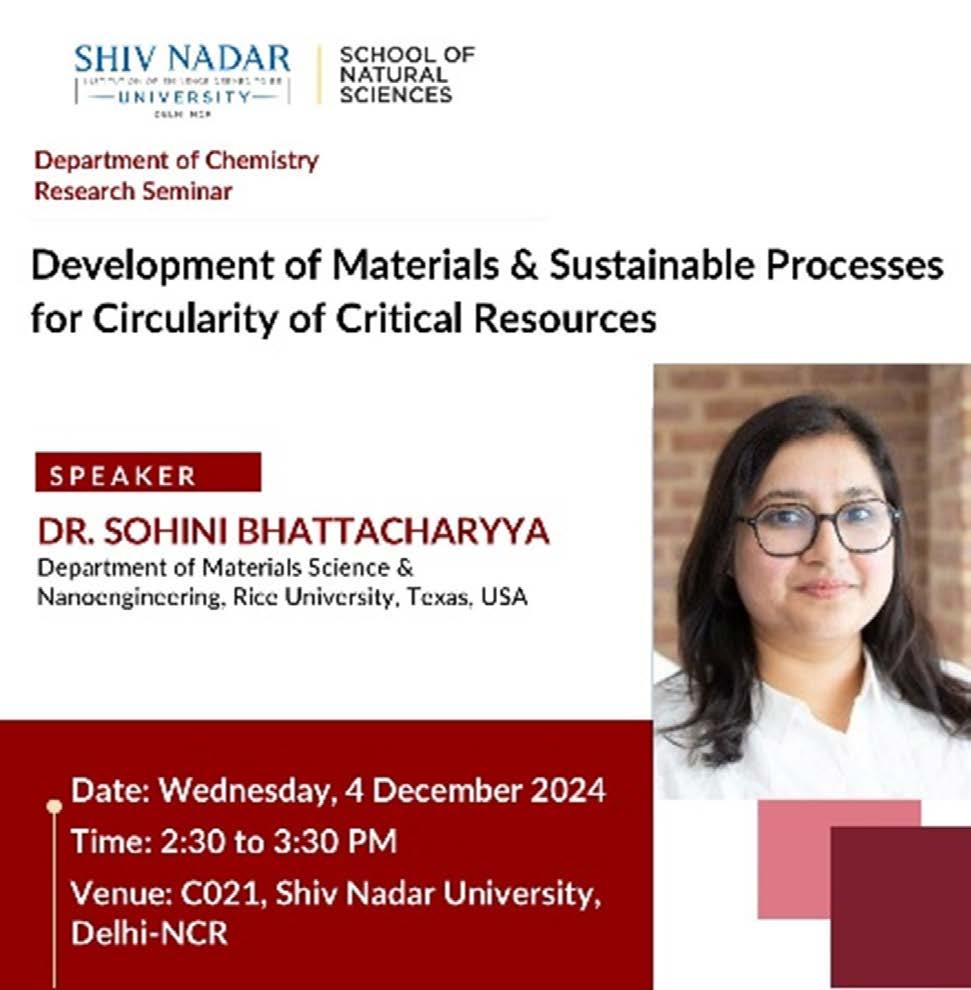

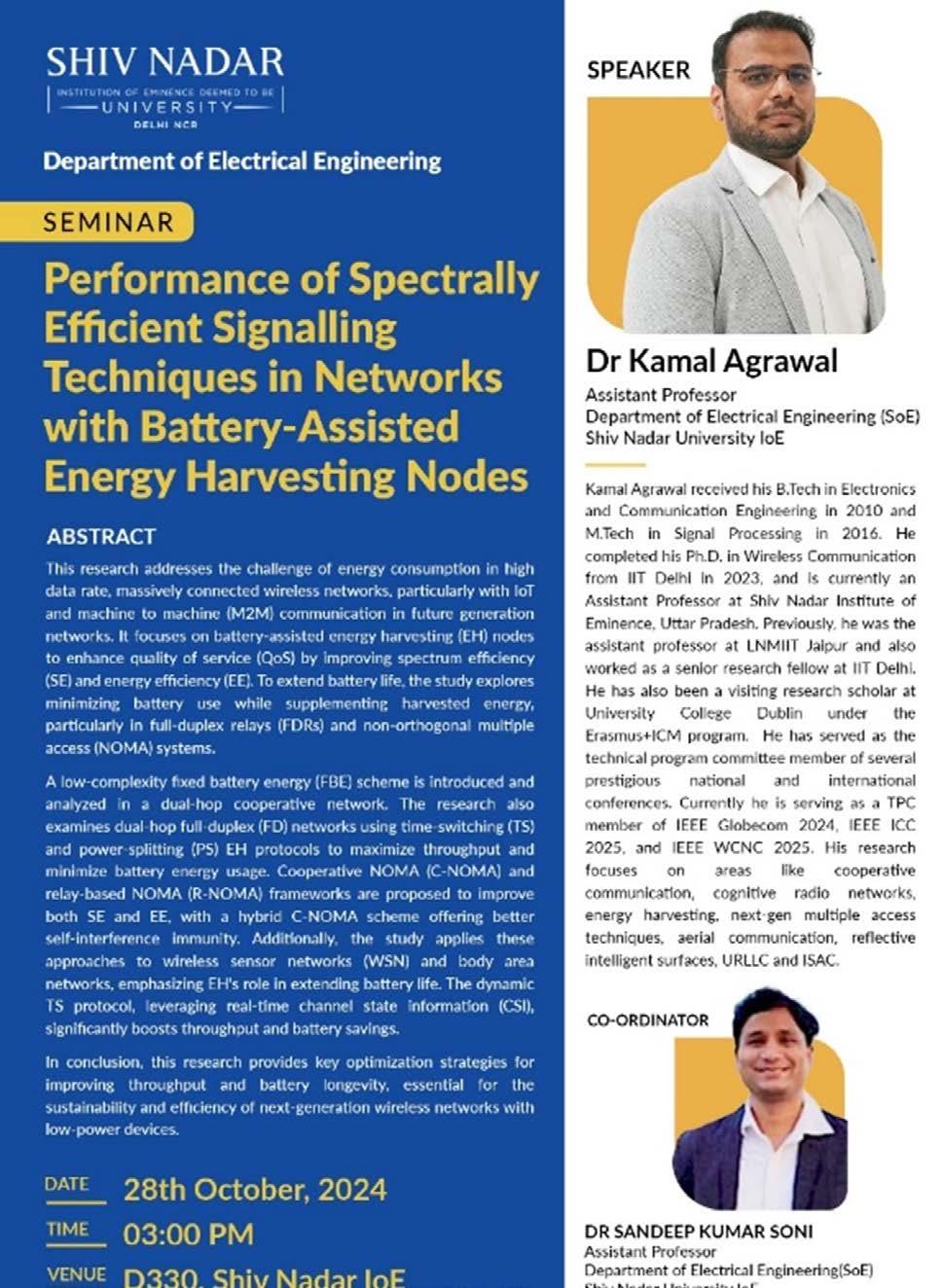
UNIVERSITY OPERATIONS
Campus Food Waste Tracking System
The university has a comprehensive and documented food waste tracking system to measure and monitor food waste at each level, i.e., production, handling, storage, processing, and distribution. Taking efficient measures and maintaining a daily food waste log, we reported a considerable decrease in food waste per person in 2024. This also gives the dining hall vendors a minimum guarantee to keep a check on production, and food waste is used for composting on campus.
We have taken multiple initiatives in the structured sustainability framework with specific targets and timelines.
Efforts on campus
Shiv Nadar University realizes its responsibility towards a sustainable environment and is committed to contributing to the overall socioenvironmental sustainability by embarking on a journey to make the campus not only a ‘Carbon Neutral’ campus but also work on other UN sustainability goals across various functions at the campus.
1. Green Building Design and Operations
All buildings on campus comply with the National Building Code, certified by the Indian Green Building Council (IGBC) or Leadership in Energy and Environmental Design (LEED). Several buildings are LEED Gold certified and incorporate green building principles such as natural lighting, efficient insulation, sustainable materials, and low-flow plumbing fixtures, thus making them water and energy-efficient. Besides achieving EHS certification, the university has a policy that promotes environment-friendly and low-emission practices in water, energy, waste, habitat protection, etc. We have also been awarded ISO 14001:2015 and ISO 45001:2018 accreditation without any nonconformance or observation.
2. Renewable Energy on Campus
We have undertaken an initiative to transition to clean energy sources on campus. As part of this, a 1.6 MW solar power plant is installed and commissioned on campus that takes care of as much as 26 percent of the needs of the campus. The goal is to go to 30 percent and beyond.
3. Water Conservation Measures
We have an extensive process for on-campus water extraction and ensure compliance with the daily extraction limit provided by the Central Ground Water Authority (CGWA). We undertake extensive documentation of water usage and reuse. Water is collected through rainwater harvesting infrastructure and reused for horticulture through tanks and pipes for irrigation. Water-conscious planting has resulted in a green campus and reduced irrigation requirements. The campus is home to many droughttolerant plants.
Most buildings on campus are certified by agencies such as IGBC and LEED and comply with extensive requirements for water conservation. We have obtained the IGBC Gold certificate and meet the LEED ratings, wherein 15% of the credits impact water resources. Other measures include low-flow faucets and toilets, and water-efficient landscaping practices. We have also installed a 500KL sewage treatment plant to reuse water for irrigation and horticulture.
4. Enhance Energy Efficiency
We have a system for continually reviewing campus energy use and identifying opportunities for improvement to update our energy consumption analysis and conservation plan. This helps in energy
optimization through energy-efficient practices on campus. Many energy-efficient appliances have been incorporated, such as:
• Energy Optimization Monitors in our LEED and IGBC- Gold certified building with integrated sensors, IoT devices, and automation systems for optimized energy use and reduced overall environmental impact
• Effective electric vehicle infrastructure on campus to transition 50% of the car fleet to electric vehicles, increase mobility on campus, and reduce carbon footprint and dependency on fossil fuels.
• Modular sewage treatment plant technology is installed on campus and has a capacity of 734 KLD. The STP currently treats 550 KLD of water from the entire campus, including campus housing.
• Monitoring platforms installed to track energy usage, waste generation, water consumption, and other sustainability metrics to enable informed decisions for continuous improvement
• 1.6 MW solar panels installed on campus across academic and residential blocks to transition from complete captive power and generate clean, sustainable energy on campus
• Energy-saving policy embraced, replacing 11 KV grid power with a 33 KV grid power supply and removing the need to run standby power through diesel generators.
As a part of our Energy Consumption Analysis and Conservation Plan, we review our energy use continually to identify opportunities for improvement. To document the energy consumption of each building, electricity meters are installed in every building, and a complete analysis of energy consumption is reported every month in the “Energy Performance Index Report.” This helps to check waste continuously.
5. Alternative Mode of transport to achieve sustainable transportation
We are a residential campus for all students and many faculty members. For those who stay outside the campus, a well-planned transport system is in place, and employees are encouraged to be sensitive to their use and optimize their air and road travel. For weekly needs, planned shuttles are provided. To transition to clean power and reduce dependence
on fossil fuels, we plan to transition 50% of the car fleet to electric vehicles. The university currently has 60% CNG, 30% petrol, and 10% diesel cars. The plan is that any new inventory added to this would be an electric vehicle.
On campus, we use sustainable transportation options such as walking, biking, carpooling, and public transit. We have a fleet of E-buses and Golf carts with over 150 seating capacity. This, in turn, has helped increase mobility on a large campus like ours and is also a step towards reducing the carbon footprint and dependency on fossil fuels.
6. Sustainable Food Options on campus and Local Sourcing
The University supports the local community with significant economic opportunities and provides fresh and sustainable food choices from local sources to university residents. We have partnered with a local organic farm, Jaivik, where the university sources organic food. The farm is situated within 15 miles of the campus. The produce is procured every week to prepare meals served on campus.
7. Reduce waste and Recycle
We have implemented comprehensive waste reduction and recycling programs to encourage a culture of rethinking consumption patterns on campus. The following are some examples,
• The campus has a restrictive use of plastic. This behaviour is encouraged on campus through communiques and posters for responsible consumption and conservation. Since 2019, plastic waste has been monitored, tracked, and disposed of through green disposal methods. To date, we have achieved a 47% decrease in plastic waste disposal. Wastepaper collection and disposal happen through government-certified recyclers, which provide recycled paper, paper, and other stationery. Besides, using recycling bins across campus, composting organic waste, and reducing single-use plastics. We have special contracts and systems for safely disposing of hazardous and medical waste.
Paper conservation
• 53 % decrease in paper consumption (A4 sheets)
• 41% decrease in usage of Toilet Rolls
• 48% decrease in usage of Tissue paper
• 25% decrease in paper Cup

• Food Packaging and Serving on Biodegradable Bagasse
• 87% increase in recycling paper, wood, and plastic waste
• Free Store is a student-led initiative on campus to promote recycling. The university community has enthusiastically responded to converting pre-loved clothes into re-loved garments for someone else.
• We have set the culture of holding a sustainable convocation, which includes a full spectrum of associated digital experiences, significantly reducing the volume of printed convocation materials.
• We offer a year-long series of short programs and masterclasses for school students.
PARTNERSHIPS
Partnership with Industry
Dr. Sanjeev Yadav, Associate Professor, Department of Chemical Engineering, and his research group work with Varhad Capitals Pvt Ltd, a Nagpurbased industry. The industry is supporting work on biomass conversion into bioenergy and has signed a Memorandum of Understanding for three years. Varhad is leading the initiatives in carbon dioxide removal (CDR) and soil enhancement. They cultivated a vast network of farmers through 165 farmer cooperatives in India. Using carbon-rich materials like cotton and pigeon pea stalks, they achieved a Carbon Dioxide Removal rate of 2.4 tons of CO2 per ton of biochar.
Dr. Yadav and his research group have also designed a portable pyrolyzer capable of using various kinds of
waste biomass, especially agri-residues, to produce biochar. This has already yielded large biochar production across many states with the help of the industry partner. Biochar production is a sustainable and environmentally responsible process that manages agricultural waste efficiently.
Industry-Academia partnership to drive sustainable technological advancements
Shiv Nadar University, in partnership with Bharat Petroleum’s Corporate Research & Development Centre (CRDC), is a significant stride towards advancing sustainable chemical processing technologies. By focusing on process intensification for highly exothermic reactions, the project aims to develop novel reactor designs that enhance energy efficiency and reduce waste. This initiative aligns with several critical sustainable development goals, including Goal 9: Industry, Innovation, and Infrastructure - By fostering sustainable industrial innovation and infrastructure development through advanced reactor designs. Goal 12: Responsible Consumption and Production – By emphasizing efficient heat management and reducing the environmental impact of chemical processes. Goal 13: Climate Action - By enhancing energy efficiency and minimizing waste, our collaboration contributes to efforts to mitigate climate change impacts.
This partnership exemplifies how industry-academia collaborations can drive sustainable technological advancements, aligning with India’s commitment to the United Nations Sustainable Development Goals (SDGs). This partnership project is going to have a positive impact on industry standards and environmental sustainability.

Shiv Nadar University partners with CSIR- National Physical Laboratory (NPL)
Shiv Nadar University, Delhi-NCR, has entered into a Memorandum of Understanding (MoU) with CSIR-National Physical Laboratory (NPL) to foster scientific collaborations for mutual and societal advancement. The MoU was signed by CSIRNPL Director, Professor Achanta Venugopal, the University’s Dean of Research and Partnerships, and Dean of Engineering, Professor Suneet Tuli. This agreement will complement NPL’s expertise in metrology, materials science, and environmental studies with Shiv Nadar University’s multidisciplinary research capabilities. The collaboration will facilitate student and faculty exchanges, collaborative research initiatives, knowledge sharing across educational and research programs, and developing joint project proposals for grant funding.

Shiv Nadar University partners with Fairtrade India (FTI)
Shiv Nadar University signed a Memorandum of Understanding with Fairtrade India (FTI) to facilitate different forms of collaboration in education, research, sustainable procurement, and public engagement.
FTI’s work aligns closely with the university’s social justice and sustainability values, and its programs provide an easy format for making practical


Shiv Nadar Institution of Eminence is fully committed to the UN Sustainable Development Goals (SDGs). We have embraced a four-pronged strategy for SDGs through teaching, research, our core institutional practices, and partnerships.
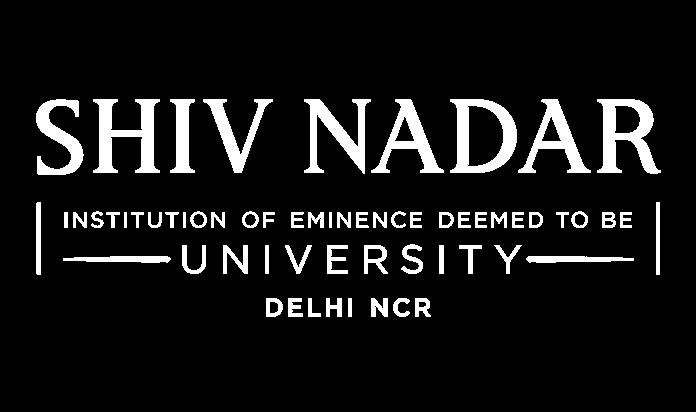
Deepa Hazrati Senior Manager, Office of the Vice-Chancellor deepa.hazrati@snu.edu.in
Shiv Nadar Institution of Eminence Gautam Buddha Nagar, Uttar Pradesh, India
